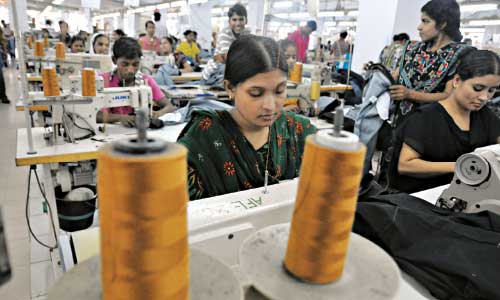More than 80 per cent member factories of the Bangladesh Garment Manufacturers and Exporters Association have failed to implement the association’s programme to develop biometric databases of workers by Saturday’s deadline.
Under the circumstances, the BGMEA has decided a temporary suspension of service delivery to the member factories which are yet to carry out the programme launched back in November 2015. The BGMEA is empowered to issue utilisation declaration certificates against exports of its members.
The association in November asked its members to introduce biometric database of workers in their respective factories by December 31.
In a circular, the BGMEA at the time said, as per the rules under the labour act, RMG exporters would have to deposit 0.03 per cent of the total export proceeds in a central fund established by the government, and financial assistance for the deceased and disabled workers and premiums of group insurances will have to be paid from the fund.
To avail the benefits of insurance premium, a workers’ database is a must, the trade body said.
‘After reviving the biometric databases of workers in November, we extended time twice, but about 2000 member factories are yet to come under the process,’ BGMEA vice-president Ferdous Parvez Bivon told New Age.
He said the BGMEA board of directors on Saturday decided to stop services for the member factories in Dhaka zone who have failed to implement the workers’ biometric database programme. He said the number of such factories is more than 1,800.
The BGMEA board also extended the deadline for carrying out the programme by one more month for the factories in Chittagong, Bivon said.
According to him, a total of 650 RMG factories have so far come under the programme and already 7.5 lakh workers of 550 factories have been enlisted in the biometric databases.
Following the 2013 Rana Plaza disaster that killed more than 1,100 people, mostly garment workers, the then BGMEA president Atiqul Islam asked the member factories to prepare biometric databases of their workers.
On May 20, 2013, he instructed the factory owners at Ashulia in Dhaka to complete biometric databases of their workers by August 30 that year, but as of December 25, 2015, only 301 factories entered the names of their workers in the databases.
Bivon said they started to work from the point where the process was stopped, as the databases at about 301 factories were completed in the first phase in 2013.
On November 2015, the BGMEA renewed its agreement with two IT firms — Systech Digital Limited and Tiger IT Bangladesh Limited — to revive the programme for enrolment of biometric capture of the workers that started in June 2013.
Source: New Age










